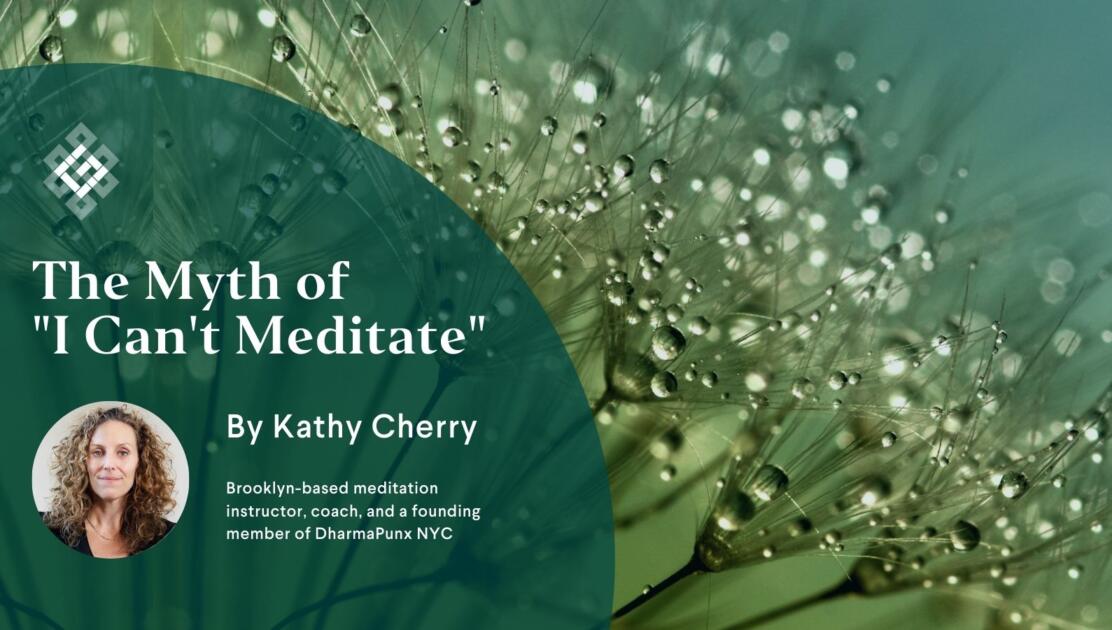The Myth of “I Can’t Meditate”
There could be lots of reasons behind the image below. I suspect it tugged at my heart because I read it as a statement that says, “I give up! I can’t meditate.” It’s a similar feeling I get when friends hear that I’m heading off to sit retreat and say “I could never do that,” or “Geez, I’d lose my mind with boredom.”
Maybe the first question to ask is, “Do you feel drawn to do that?” If the answer is “Nope, not my jam,” we need to respect that.
But if there’s that tug of curiosity or the sense of spiritual longing, the assumption that “I can’t do” something is an obstacle of our own making that is worth investigating. [Click here for Kathy’s upcoming retreat, Pathways of Ego Transcendence, with Josh Korda.]

When an idea about something we want to do becomes overwhelming, it’s often because we’re imagining the outcome, not the process. It’s the process itself that familiarizes us with what the outcome looks or feels like. The confidence is built through the experience and ongoing practice of moving toward the intended outcome.
That said, there’s also the little fly of impermanence in the ointment of the outcomes. Even when we learn something, there are times when we might not be at our best. Having a flexible and friendly sense of self in relation to that will do wonders toward keeping your cushion and practice off the proverbial trash heap.
From the perspective of Somatic Experiencing, if there is a belief that we’re in a win/lose situation or a need to maintain something perfectly, especially when it’s combined with stress or starts to push on the levers of our sense of connection and safety, the ancient aspects of our limbic system, which prioritize survival above all else, start to kick in. Unfortunately, that activation usually means we drop into our conditioned habit patterns. Maybe we give up, maybe we get angry and find reasons to blame others, maybe we check out.
Retreat practice gives us the opportunity to let go of the daily legwork of being a human in the world. In doing this we start to see, in small and innocuous ways, how that sense of self is built through our contact with the world. In my estimation, the feeling tones of liking, disliking, or neutrality directly correlate with the ancient aspects of our nervous system which tell us whether we’re safe and connected and have enough of what we think we need—or not.
Small and innocuous has a way of taking the pressure off the watching. This has the power to make the insignificant completely relevant. When I’m on the breakfast line and notice the blueberries quickly disappearing from the bowl—there’s that disliking, a tension. Mindfulness allows me to notice that, tie it to the story of how I won’t get my share. When I can see how that experience now connects back to similar experiences in the past, I can also see what is different now. That sense of self can start to shift.
I’m still “selfing,” but I’m doing it in the present. I can see the difference between this experience and experiences from the past. This reduces the stress response and frees up agency that is available. As the charge starts to dissipate, I can remember—there are always more blueberries at Garrison Institute. When we are present for small learnings like this, we plant the seeds for that understanding to be available when the stakes are higher.
**********
Kathy Cherry is a Somatic Experiencing® practitioner, Mindfulness & Meditation instructor, and coach with over two decades of dedicated mindfulness practice in the Insight Meditation tradition. She combines Somatic Experiencing® with Mindfulness and Buddhist teachings to create an integrative approach that helps connect the intellect, body, and senses to facilitate health and regulation. Her style emphasizes embodiment, compassion, and practical wisdom both in meditation practice and in everyday life.
